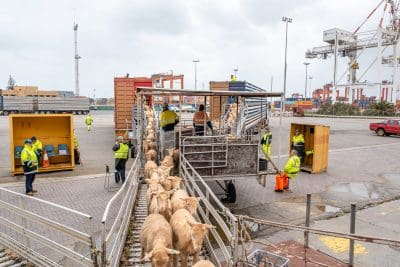Dr Tony Brightling clearly has extensive experience in Australia’s live export trade and is entitled to his views. However he has twice now commented in support of Labor’s malign ban on live sheep exports, which should be addressed and refuted.
Dr Brightling is correct when he says that live export provides an outlet for surplus sheep. He’s also right when he says that Australian sheep have been a staple food for millions in the Middle East.
Again, he’s right when he acknowledges the raft of changes that were implemented to reduce animal welfare risks and that these changes have increased the commercial costs of servicing these markets.
Absolutely no disagreement so far. But where he goes drastically off course, is when he implies that to remain commercial, the industry needs to (or even wants to) ‘wind back’ animal welfare measures. On this he could not be more wrong.
The only thing the Australian Livestock Exporters’ Council, and our allies in the Keep the Sheep movement want to wind back is a ban that doesn’t recognise the significant changes that have occurred – through industry and government working together. We’ve consistently said that the industry’s highest priority is animal welfare, both because it is the right thing to do, and it makes commercial sense. We know from community sentiment research, undertaken by CSIRO spin off Voconiq, that animal welfare matters to the Australian community. It is the bedrock of trust on which our industry operates.
The Exporter Supply Chain Assurance System (ESCAS) makes Australia the only country in the world that indirectly imposes requirements on importing customers. What Dr Brightling misses is that older Australian wool producing Merino sheep have significant value in these markets – greater commercial value than they have at home.
Australian sheep have world-leading genetics and are free from many diseases that sheep suffer from in other countries. They can tolerate heat well and produce better quality and more meat than sheep from competing countries, so attract a higher price… This meat quality is significantly impacted by an animal’s stress levels and welfare, so Australia maintains our competitive advantage through treating animals well throughout the supply chain.
Dr Brightling doesn’t touch on the benefits that the trade brings importing countries, helping them meet their food security needs, improve food safety and subsequently improve the standard of living in these countries. Customers in Middle Eastern countries have invested millions in improving their depots, feedlots and abattoirs with significant help from Australian exporters. When the Australian Government works together with industry – both exporters and importers – we achieve great things. A unilaterally imposed ban puts this cooperation at risk.
Despite Government rhetoric insisting there is ‘opportunity’ in the ban for farmers, the WA Government’s figures indicate that the WA sheep flock has decreased by 25% in the past 12 months.
This speaks to thousands of farmers, and their communities being utterly devastated by the political whim of a government that has taken activist propaganda hook line and sinker. Sheep production in WA is reliant on a strong wool sector, a strong processing sector and a strong live export industry. Together, these competitive market forces create viability in sheep production in the west. Some co-designed talkfests and insignificant financial grants aren’t going to fix the structural damage caused by the removal of a key market.
Markets exist due to demand. In the case of live sheep exports, this market will not die unless deliberately killed by Government. Indeed, the Kingdom of Saudi Arabia recently re-opened late last year and since then export volumes have increased and we have real interest from Morocco, Algeria, Turkey, the USA and Indonesia.
The commercial viability of a product, a market or an industry will be determined by the market and the participants in that market. It is not for Dr Brightling, or the government, or any other to state that “There is no realistic prospect of a viable live sheep export trade after 1 May 2028. Time to move on”.
This dismisses the thousands of farmers, truckies, shearers, stockies and agents, who derive a living from the trade and the 100,000 signatories to the Keep the Sheep petition who want to see it continue. It is clear the Albanese Government has clearly underestimated the level of support for the continuation of the live sheep industry.
The facts are that economic conditions can change and there is a pathway to have the ban overturned. As long as this exists then we should pursue it, and ALEC will do so unapologetically.
Author Mark Harvey-Sutton is the CEO of the Australian Livestock Exporters’ Council.

